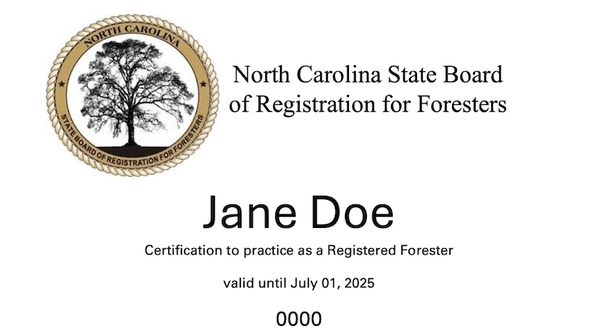More than 60 percent of North Carolina is forested, but much of this valuable resource is not actively managed. Properly managed forests can generate extra money from the sale of timber products; improve wildlife habitat, aesthetics, recreation, and water quality; and increase land value. By seeking the assistance of a professional forester, you can maximize the return on your forestlands.
Seeking Professional Advice...
There are a number of factors to consider when seeking professional advice. Here are some questions to ask:
What are your qualifications?
- How many years of experience do you have, and what type of experience have you had?
- What is your educational background?
In North Carolina, registered foresters generally hold a bachelor of science or higher degree in forestry or have shown equivalent knowledge by passing the examination given by the North Carolina Board of Registration for Foresters.
What are your fees, and what services do you provide?
Fees and services offered by professional foresters vary considerably. Fees may be based on an hourly, daily, or acreage rate or maybe based on a percentage of gross revenues generated by a contracted activity such as a timber sale.
Are you associated with a sawmill or wood products firm?
Some forest industries employ foresters who can help landowners manage their private forestland, but many of these businesses also buy timber. To prevent a possible conflict of interest, avoid management advice from those who buy timber.
Can you provide references from previous clients?
Talk to the people who provide references to see if they were satisfied with the services they received. Ask these questions:
- Was the forester willing to discuss management goals and options on your property?
- Was the forester willing to manage for multiple species and products?
- Was the forester available throughout the project?
Ask to visit sites to see the results of their forestry work "on the ground."
To verify if a forester is registered in North Carolina, visit the North Carolina Board of Registration for Foresters.
Once you select a qualified forester, you should sign a contract. Include a list of services to be performed and specify who will perform them, when they will be performed, and how the forester will be paid for those services.
| Available Service | Cooperative Extension | North Carolina Forest Service | Farm Service Agency | Natural Resources Conservation Service | Wildlife Resources Commission | Consulting Forester | Industry Forester |
|---|---|---|---|---|---|---|---|
| References & information | XXX | XXX | X | XX | XXX | X | XX |
| Educational workshops | XXX | XX | XX | XX | |||
| On-site visits | XX | XXX | XXX | XXX | XXX | X | |
| Management plans | A | XXX | A | X | XXX | X | |
| Cost-share opportunities | A | XXX | XXX | XX | A | A | A |
| Boundary surveys | XXX | ||||||
| Timber appraisals | XXX | ||||||
| Timber sale contracts | A | A | XXX | X | |||
| Timber marked for sale | X | XXX | X | ||||
| Logging oversight | A | A | XXX | X | |||
| Site prep and planting | A | XX | A | XX | X | ||
| Wildlife management | A | A | A | XX | X | ||
| Prescribed burning | A | XXX | A | XX | A | ||
| Timber stand improvements | A | A | XX | X | |||
| Key XXX always available, XX ususally available, X sometimes available, A advice only |
|||||||
See a Forester First...
A couple was recently offered an unsolicited bid of $20,000 for their 20 acres of mature pine saw timber. Realizing the complexity of selling timber, the couple hired a consulting forester to watch out for their interest.
The consulting forester, who worked on a contract price of a percentage of the gross revenue, conducted a sealed-bid timber sale. Gross revenue from the sale was $39,895—$19,895 more than the original unsolicited bid. This increase in income was significantly higher than the fee charged by the consulting forester.
North Carolina requires foresters to be registered.
Registered foresters must meet educational and experience requirements.
A North Carolina registered forester can be identified by this credential.
For further information concerning forestland management and hiring a professional forester please contact your local North Carolina Cooperative Extension Center or the North Carolina Forest Service office. Also, visit Extension forestry’s website.
Publication date: May 11, 2015
AG-619
N.C. Cooperative Extension prohibits discrimination and harassment regardless of age, color, disability, family and marital status, gender identity, national origin, political beliefs, race, religion, sex (including pregnancy), sexual orientation and veteran status.

